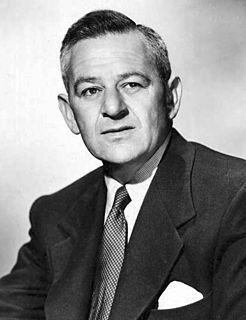A Quote by William Wyler
If we must have the Production Code, then I think the only way to use it effectively is to judge a film as a whole and determine whether its effect is good or bad.
Related Quotes
Personally, I think government is a tool, like a hammer. You can use a hammer to build or you can use a hammer to destroy; there is nothing intrinsically good or evil about the hammer itself. It is the purposes to which it is put and the skill with which it is used that determine whether the hammer's work is good or bad.
When it comes to partisan politics, everyone is a hypocrite. And all they care about is whether it hurts or helps them ... Is it good or bad for the Democrats? Is it good or bad for the Republicans? Is it good or bad for Jews, or good or bad for blacks, or is it good or bad for women? Is it good or bad for men? Is it good or bad for gays? That's the way people think about issues today. There is very little discussion of enduring principles.
I think the only way one can really determine whether extremism in the defense of liberty is justified, is not to approach it as an american or a european or an African or an Asian, but as a human being. If we look upon it as different types, immediately we begin to think in terms of extremism being good for one and bad for another, or bad for one and good for another. But if we look upon it, if we look upon ourselves as human beings, I doubt that anyone will deny that extremism in defense of liberty, the liberty of any human being, is no vice.
The film industry is a great industry, with infinite possibilities for good and bad. Its primary purpose is to entertain people. On the side, it can do many other things. It can popularize certain ideals, it can make education palatable. But in the long run, the judge who decides whether what it does is good or bad is the man or woman who attends the movies.
The whole meaning of morality is a rule that we ought to obey whether we like it or not. If so, then the idea of creating a morality we like better is incoherent. Moreover, it would seem that until we had created our new morality, we would have no standard by which to criticize God. Since we have not yet created one, the standard by which we judge Him must be the very standard that He gave us. If it is good enough to judge Him by, then why do we need a new one?
When you're making a film, you don't really have time to consider what the whole of your film is. And then, when you're releasing your film and promoting your film, you're looking at it in a different way. Then, as you move away from it, you start to look at it objectively and think, 'What could I have done better?'





































